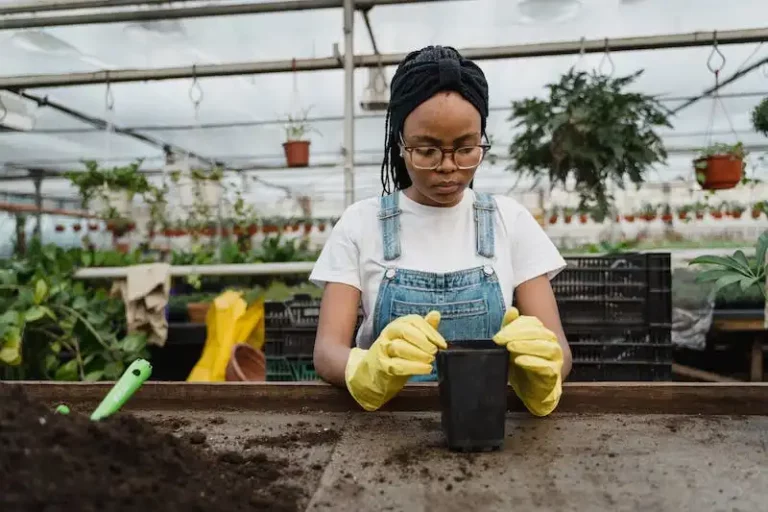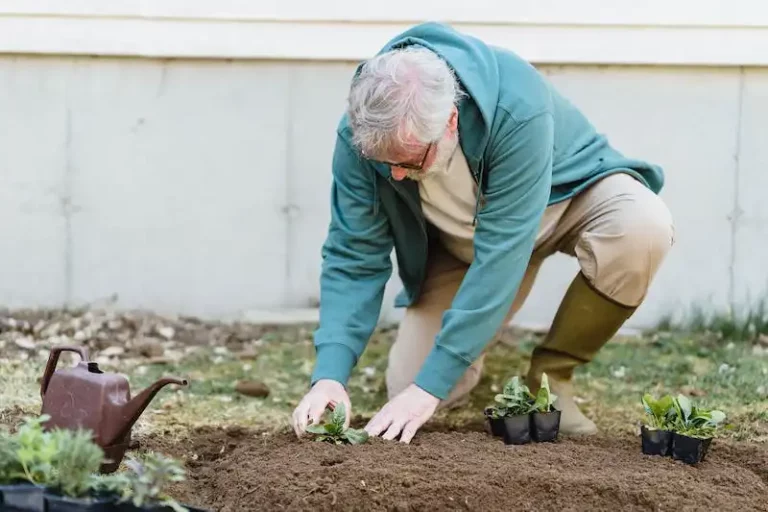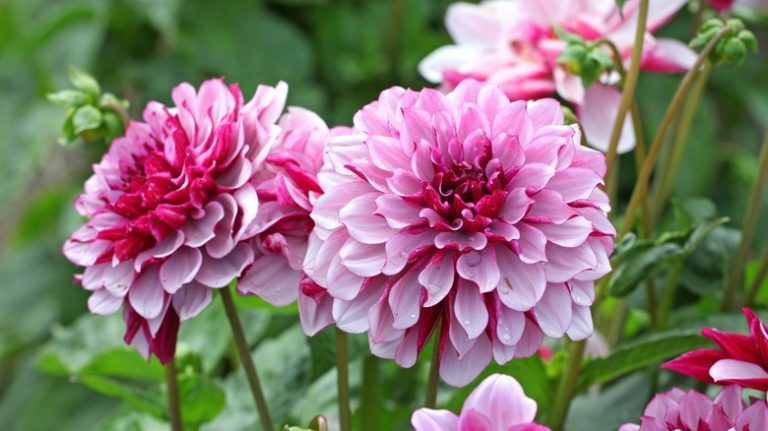Decorating with orange brings vibrancy and fun to any atmosphere. That’s why orange flowers are the perfect choice for hanging baskets when you want the vibe to be extra welcoming and energetic.
No matter your USDA hardiness zone, there’s an orange bloom that’s ideal for your yard. Before you buy your plants, make sure you know how much sun and shade bathe the area daily where the hanging basket will reside. You’ll also want to think about the type of arrangement for the space — one flower or many. According to Salisbury Greenhouse, there’s a container design rule that will lead to success: Include a spiller that dangles over the side of the container, a filler that fills up the bulk of the pot, and a thriller that really catches the eye.
Hanging arrangements will usually need more fertilizer, but it will depend on the types of flowers in the mix. They will also require more frequent watering because the soil heats up and dries out as the sun bakes the container. Once you have that figured out, it’s time to pick your favorite orange-flowering plants — just remember to pick flowers with similar hardiness zones and sun needs.
1. Orange petunia
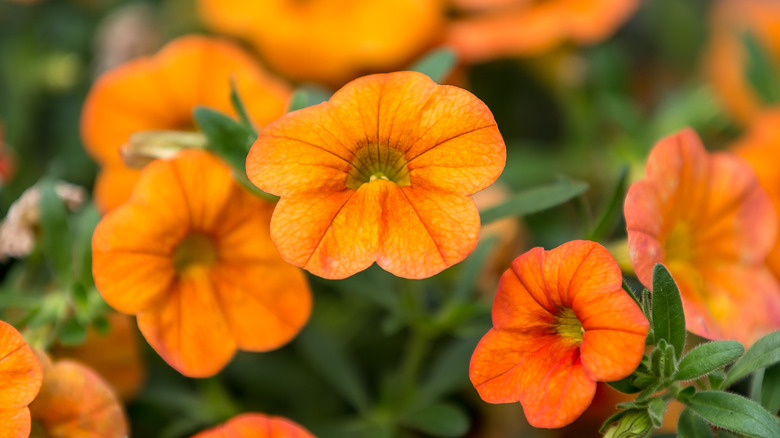
Petunias are vibrant and easy to grow. Orange ones, however, are banned in Europe. Allen Bush, founder of Jelitto Perennial Seeds and contributor to GardenRant, said, “Petunias have no natural orange gene.” So, when these lovelies began popping up in 2024, a watchdog group reported that seed stealing and splicing had occurred. Europe forbids genetically modified or genetically engineered food items and ornamental plants. Although briefly banned in the U.S. as well, the USDA deregulated these blooms in 2024.
- Bloom Season: Spring through fall
- Hardiness Zones: 3 to 11
- Care: Prefer full sun, partial sun is okay
- Soil: Well-drained soil
2. Fuchsia
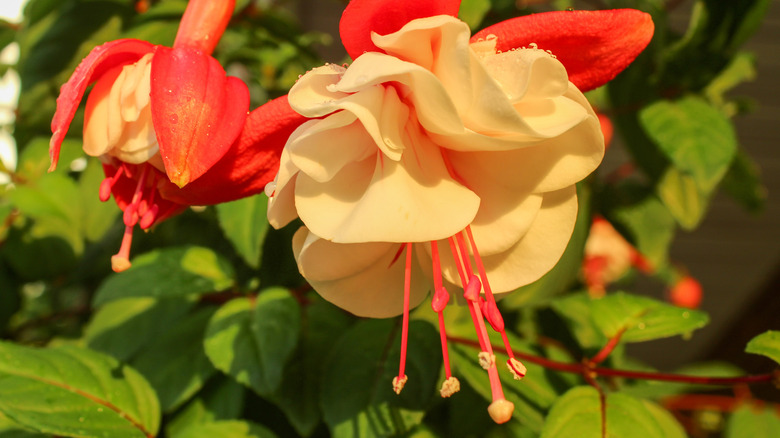
Tim Pennington/iStock
To incorporate subtle hints of orange in your flowering basket, fuchsias can be a spectacular choice that look great in any arrangement, especially ‘Novella’ Fuchsias with its coral colored corolla and pinkish tube petals. According to Gardenia, this stunning flower works wonderfully in hanging baskets and blooms continuously throughout summer and into fall, attracting hummingbirds and bees alike.
- Bloom Season: Early summer to first severe frost
- Hardiness Zones: 10 to11
- Care: Full sun, partial shade
- Soil: Moist, fertile, well-drained
3. Phlox
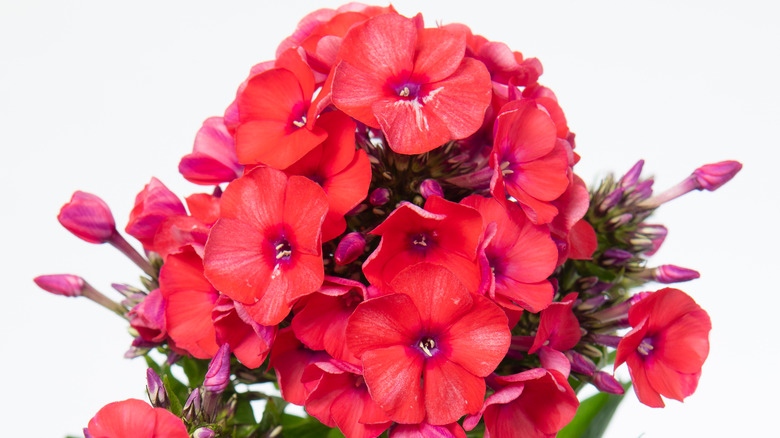
InfoFlowersPlants/Shutterstock
Phlox has a way of spreading abundantly, so container growing these gems is a great way to have a beautifully full hanging basket. These are late summer bloomers and are perfect for jazzing up your porch or garden as other flowers begin to fade. According to Michigan Bulb Company, this stunning orange phlox is a lovely complement to warm and cool tones.
- Bloom Season: Mid-spring through mid-summer
- Hardiness Zones: 4 to 8
- Care: Full sun, partial shade
- Soil: Moist, fertile, well-drained
4. Begonia
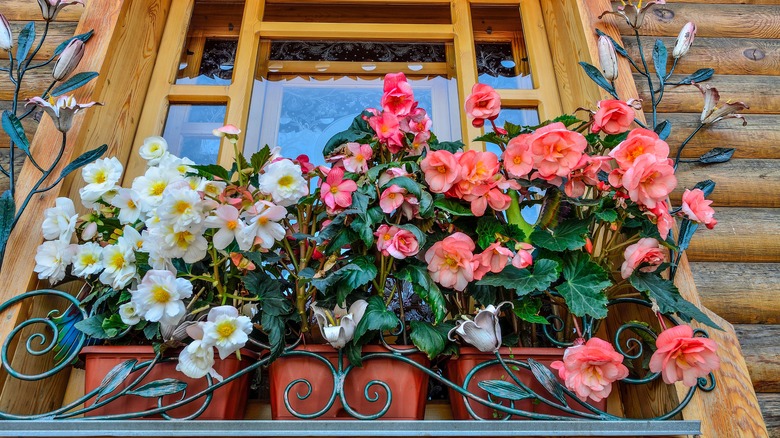
Olga Vasilek/Shutterstock
Begonias are celebrated for their easy care, versatility, and beautiful flowers and foliage. One special variety, he Apricot and Scarlet Sunburst begonia, which is a California Hybrid plant, displays exotic hues of peach and deep red. According to Holland Bulb Company, it produces many stunning blooms and, as with other begonias, is great for container gardening from summer to first frost.
- Bloom Season: Early summer until first frost
- Hardiness Zones: 8 to 10
- Care: Partial shade, full shade
- Soil: Well-drained
5. Marigold
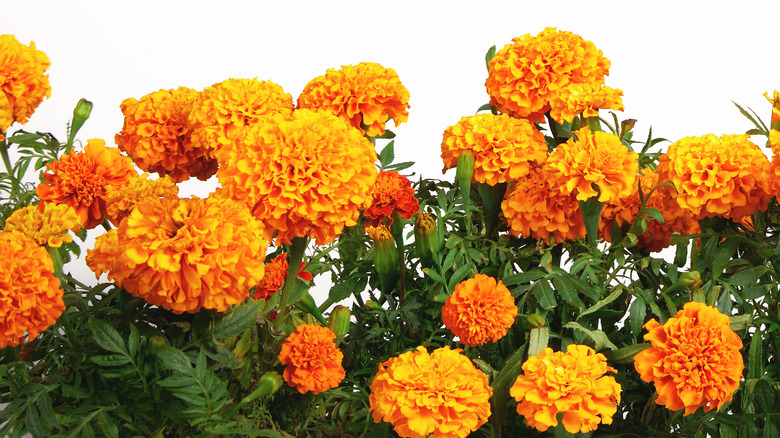
ganjalex/Shutterstock
In clusters of orange, yellow, and red, these small pompoms bring a pop of color to your hanging arrangement. According to Clemson Cooperative Education, they bloom reliably all summer long and continue into fall. Marigolds are a favorite of bees, other pollinators, and also ladybugs. In Mexico, the marigold is one of the main flowers used during the Day of the Dead celebration (via NPR).
- Bloom Season: Early summer through late fall
- Hardiness Zones: 2 to 11
- Care: Full sun
- Soil: Well-drained, loamy
6. Zinnia
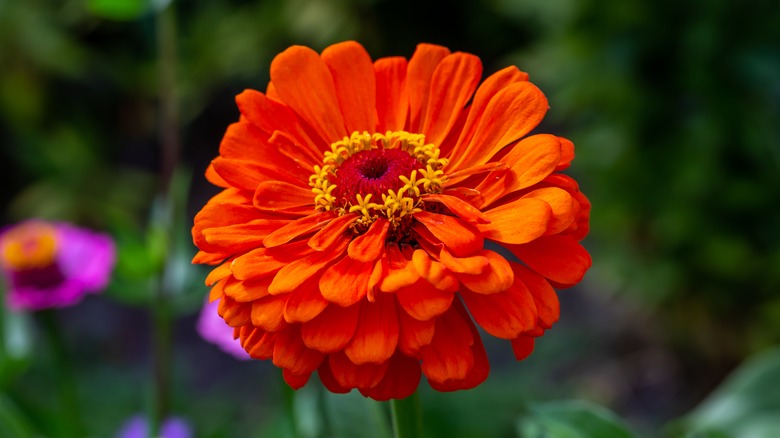
Anton Nikitinskiy/Shutterstock
Zinnias are ideal annuals for beginning gardeners due to their large seeds for planting and ease of care. They grow great in containers with proper drainage and will attract delicate creatures like butterflies and hummingbirds to the garden. In fact, pollinators love Zinnias. The flower petals grow in single-, double-, and semi-double layers and also a number of shapes, according to Almanac.
- Bloom Season: Mid-summer until first frost
- Hardiness Zones: 3 to 10
- Care: Full sun
- Soil: Well-drained
7. Dahlia
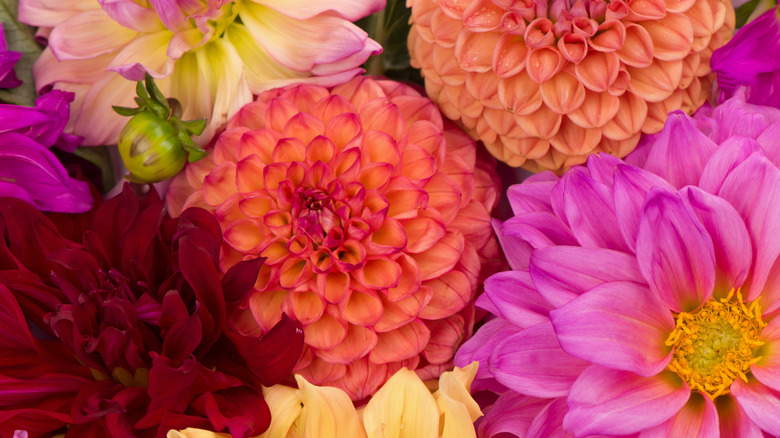
Aprilphoto/Shutterstock
“Once you grow a dahlia, you want more,” said Ray Allen, founder of American Meadows. These luscious florals are available in many colors, shapes, and sizes -– you’ll want to stick to the smaller ones for your hanging container, making sure there is plenty of drainage. Dahlias can be started indoors in colder climates as they do not do well with frost. Moist soil is best, but the bulb will rot if the soil is soggy for too long.
- Bloom Season: Late summer through fall
- Hardiness Zones: 8 to 10
- Care: Full sun with some shade time
- Soil: Well-drained
8. Gerbera daisy
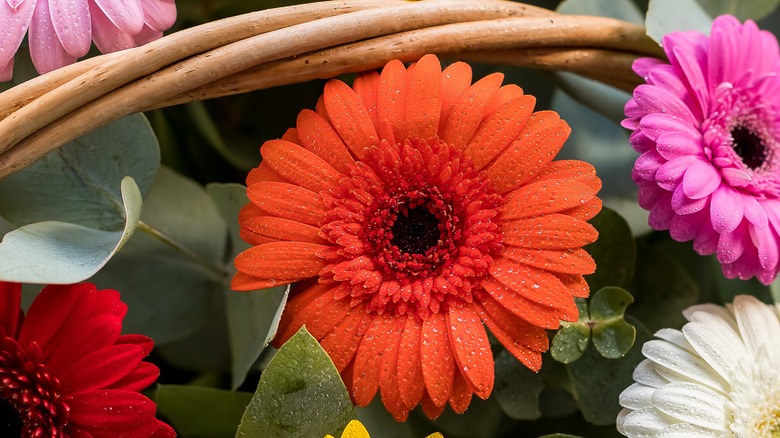
Yulia YasPe/Shutterstock
Gerbera daisies come in an array of colors and are related to sunflowers and marigolds. They are usually planted as annuals, but can survive as perennials in USDA Zone 8. They’re best planted in springtime after the last frost and will do well all summer long with deadheading and morning watering, according to Clemson Cooperative Extension. They look fantastic in baskets, pots, and bouquets.
- Bloom Season: Late spring through fall
- Hardiness Zones: 8 to 10
- Care: Full sun, partial shade
- Soil: Well-drained, moist
9. Cosmos
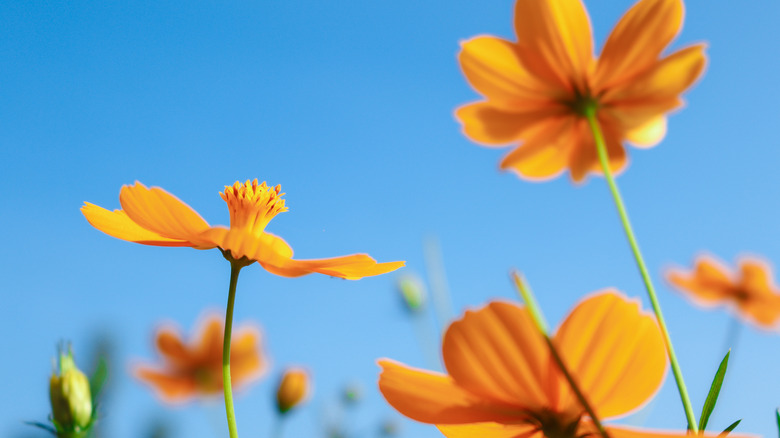
Faruq Shofihara Jazuli/Shutterstock
Cosmos are quite resilient. They tolerate hot, dry conditions and, according to Almanac, they also survive poor soil quality. You’ll want to remove flowers before they go to seed because this plant is self-seeding and will spread across your garden. For container gardening, it’s best to select a short-stemmed or dwarf variety and to keep the soil moist (but not soggy) for best growth.
- Bloom Season: Early summer through fall (if you deadhead the spent blooms)
- Hardiness Zones: 2a to 11b
- Care: Full sun
- Soil: Well-drained
10. Chrysanthemum
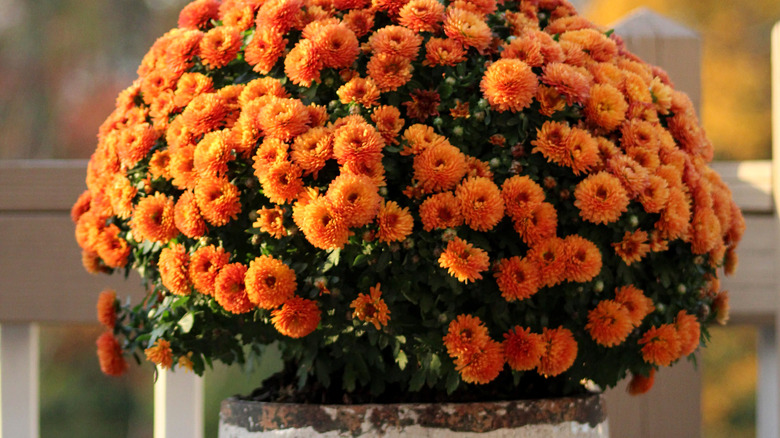
beautiful.moments.lc/Shutterstock
Their tiny florets in rusty hues are a fall favorite, but chrysanthemums also come in light or dark purple, red, and white. Fondly known simply as mums, these beauties enjoy equal day and night, according to Almanac. This gives southern mums blooms twice each year whereas northern mums bloom only in autumn. Pinching dead flowers back will result in a multitude of blooms.
- Bloom Season: Early bloomers in late July, early fall bloomers in September, late fall bloomers in October
- Hardiness Zones: Garden mums 4 to 9, potted mums 7 to 9
- Care: Full sun
- Soil: Well-drained

